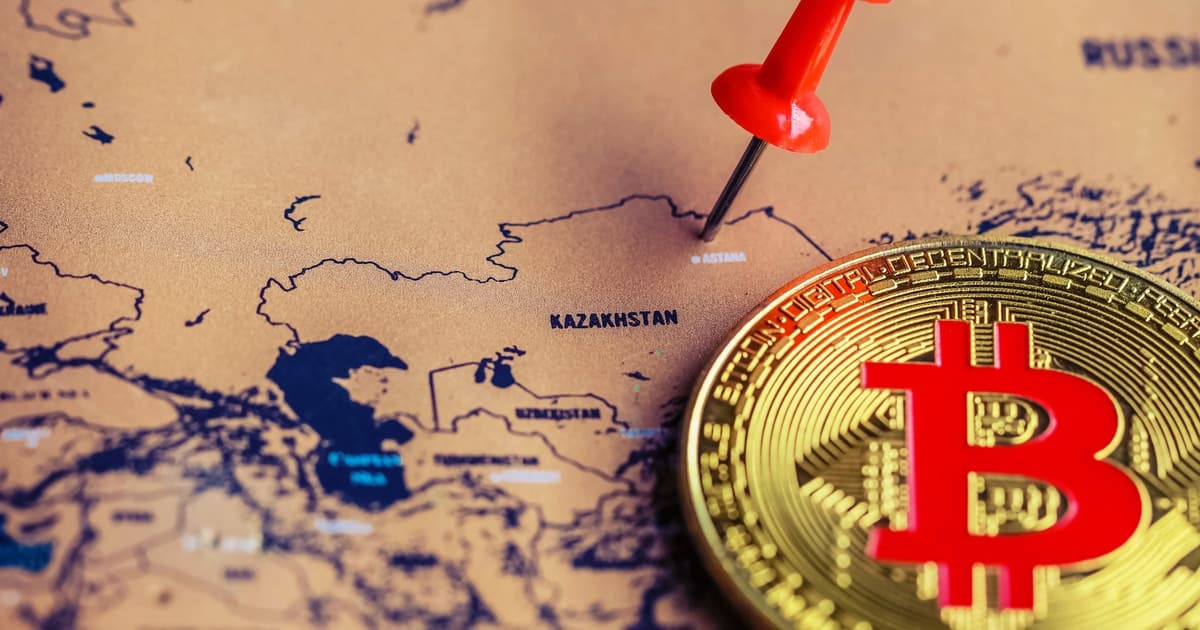The world of Bitcoin mining has witnessed a seismic shift in recent times. As China tightened its grip on cryptocurrency activities, a significant exodus of Bitcoin miners began, seeking new havens to continue their operations. Among the nations that rolled out the welcome mat was Kazakhstan, quickly transforming into a prominent hub for Bitcoin mining. But just as the dust seemed to settle, a new challenge has emerged on the horizon – power shortages. Could Kazakhstan, the rising star of Bitcoin mining, be forced to dim its lights, potentially mirroring the path taken by Iran?
The Rise of Kazakhstan as a Bitcoin Mining Powerhouse
It’s no secret that China’s crackdown on crypto sent shockwaves through the digital currency landscape. Miners, who were once heavily concentrated in China, had to scout for alternative locations. Kazakhstan, with its relatively inexpensive energy resources and welcoming regulatory environment, emerged as an attractive destination.
Consider these key points that fueled Kazakhstan’s ascent in the Bitcoin mining arena:
- Post-China Exodus: When China banned crypto mining, Kazakhstan became a prime relocation spot for displaced miners.
- Rapid Growth: Kazakhstan’s share in global Bitcoin mining surged sixfold by April of this year, marking an unprecedented expansion.
- Global Ranking: It quickly climbed to become the third-largest Bitcoin mining country, trailing only the United States and China (before the ban).
- Hash Rate Recovery: Despite an initial dip in the Bitcoin network’s hash power during the miner migration, it has bounced back to pre-crackdown levels, indicating a successful relocation and resumption of mining activities, largely attributed to countries like Kazakhstan.
The numbers speak for themselves, illustrating Kazakhstan’s pivotal role in absorbing the mining operations that were uprooted from China. But this rapid growth has brought with it unforeseen pressures, particularly on the nation’s energy infrastructure.
Powering the Crypto Dream: The Looming Energy Crisis
Bitcoin mining is an energy-intensive process. Massive mining farms require significant electricity to power the specialized hardware that solves complex algorithms to validate transactions and earn Bitcoin rewards. Kazakhstan’s energy grid, while initially sufficient, is now facing the strain of this exponential increase in demand.
Here’s the crux of the problem:
- Increased Demand: The influx of Bitcoin miners has placed immense pressure on Kazakhstan’s power grid.
- Winter Woes: The situation is expected to worsen during the winter months as overall energy consumption rises due to heating needs.
- Potential Restrictions: To ensure stable electricity supply for its population, the Kazakh government is contemplating imposing limitations on Bitcoin mining activities.
This potential curtailment raises a critical question: Is Kazakhstan heading down a similar path to Iran, another nation that initially embraced crypto mining but later had to impose restrictions due to energy concerns?
Kazakhstan Might Follow Iran’s Footsteps
Iran’s experience serves as a cautionary tale. Like Kazakhstan, Iran initially legalized Bitcoin mining to bolster its economy and circumvent international sanctions. However, the unintended consequences of unregulated mining soon became apparent.
Let’s draw parallels between Iran and Kazakhstan’s current predicament:
| Factor | Iran’s Experience | Kazakhstan’s Potential Scenario |
|---|---|---|
| Initial Stance on Mining | Legalized to aid economy | Welcomed miners post-China ban |
| Energy Situation | Power outages due to illicit mining | Facing power shortages due to increased demand |
| Government Response | Temporary mining ban imposed | Considering restrictions on mining |
| Timing of Restrictions | Summer (high energy demand) | Potentially Winter (high energy demand) |
Iran’s government had to take decisive action, temporarily banning Bitcoin mining to ensure sufficient power supply during peak demand periods. Kazakhstan may be facing a similar crossroads. The need to balance economic opportunities presented by crypto mining with the fundamental requirement of stable energy access for its citizens is becoming increasingly pressing.
Read More: Crypto Miners in Kazakhstan to Pay Higher Rates for The Electricity They Use to Mint Digital Coding
Looking Ahead: Navigating the Energy-Crypto Conundrum
The situation in Kazakhstan highlights a crucial challenge for nations embracing cryptocurrency mining: sustainable energy management. As Bitcoin and other cryptocurrencies continue to gain traction, the energy demands of mining operations will only intensify. Countries seeking to become crypto hubs must proactively address the energy implications.
Here are some potential pathways forward:
- Invest in Renewable Energy: Transitioning to renewable energy sources can help mitigate the environmental impact and strain on traditional power grids from crypto mining.
- Improved Grid Infrastructure: Upgrading and expanding energy infrastructure is essential to accommodate the growing demand, including that from energy-intensive industries like crypto mining.
- Regulatory Frameworks: Governments need to develop clear and balanced regulatory frameworks that encourage responsible crypto mining while safeguarding energy resources for broader societal needs. This might involve tiered electricity pricing for miners, incentives for using renewable energy, or strategic geographic allocation of mining operations.
- Technological Advancements: Continued innovation in mining hardware and software to improve energy efficiency is crucial for long-term sustainability.
In Conclusion: A Balancing Act for Kazakhstan and Beyond
Kazakhstan’s journey as a Bitcoin mining hotspot is at a critical juncture. While the country has successfully attracted miners and benefited from the crypto boom, it now faces the challenge of ensuring energy stability. The potential for temporary restrictions on mining activities underscores the delicate balance nations must strike between fostering technological innovation and managing essential resources.
The situation in Kazakhstan serves as a valuable case study for other countries considering embracing crypto mining. It highlights the importance of proactive energy planning, sustainable practices, and thoughtful regulation to harness the opportunities of the crypto world without compromising essential services and long-term environmental goals. As the crypto landscape evolves, navigating this energy-crypto conundrum will be paramount for nations worldwide.
Disclaimer: The information provided is not trading advice, Bitcoinworld.co.in holds no liability for any investments made based on the information provided on this page. We strongly recommend independent research and/or consultation with a qualified professional before making any investment decisions.


